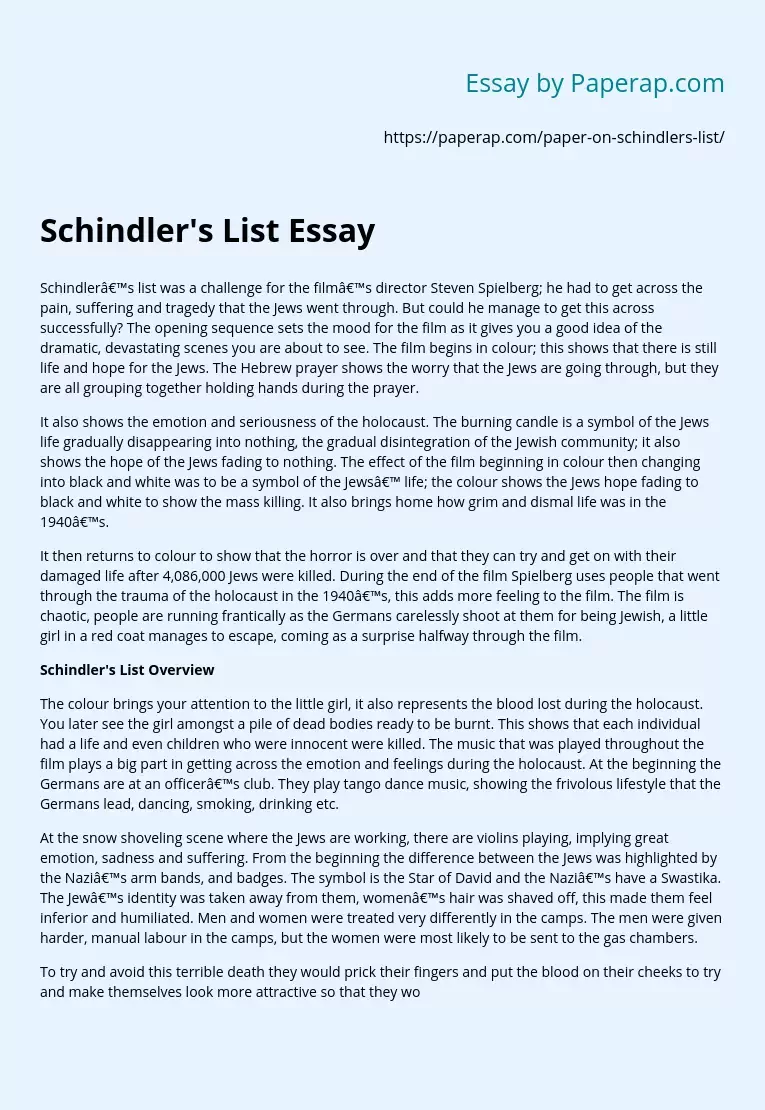Schindler's List Essay
Schindler’s list was a challenge for the film’s director Steven Spielberg; he had to get across the pain, suffering and tragedy that the Jews went through. But could he manage to get this across successfully? The opening sequence sets the mood for the film as it gives you a good idea of the dramatic, devastating scenes you are about to see. The film begins in colour; this shows that there is still life and hope for the Jews. The Hebrew prayer shows the worry that the Jews are going through, but they are all grouping together holding hands during the prayer.
It also shows the emotion and seriousness of the holocaust. The burning candle is a symbol of the Jews life gradually disappearing into nothing, the gradual disintegration of the Jewish community; it also shows the hope of the Jews fading to nothing. The effect of the film beginning in colour then changing into black and white was to be a symbol of the Jews’ life; the colour shows the Jews hope fading to black and white to show the mass killing.
It also brings home how grim and dismal life was in the 1940’s.
It then returns to colour to show that the horror is over and that they can try and get on with their damaged life after 4,086,000 Jews were killed. During the end of the film Spielberg uses people that went through the trauma of the holocaust in the 1940’s, this adds more feeling to the film.
The film is chaotic, people are running frantically as the Germans carelessly shoot at them for being Jewish, a little girl in a red coat manages to escape, coming as a surprise halfway through the film.
Schindler’s List Overview
The colour brings your attention to the little girl, it also represents the blood lost during the holocaust. You later see the girl amongst a pile of dead bodies ready to be burnt. This shows that each individual had a life and even children who were innocent were killed. The music that was played throughout the film plays a big part in getting across the emotion and feelings during the holocaust. At the beginning the Germans are at an officer’s club. They play tango dance music, showing the frivolous lifestyle that the Germans lead, dancing, smoking, drinking etc.
At the snow shoveling scene where the Jews are working, there are violins playing, implying great emotion, sadness and suffering. From the beginning the difference between the Jews was highlighted by the Nazi’s arm bands, and badges. The symbol is the Star of David and the Nazi’s have a Swastika. The Jew’s identity was taken away from them, women’s hair was shaved off, this made them feel inferior and humiliated. Men and women were treated very differently in the camps. The men were given harder, manual labour in the camps, but the women were most likely to be sent to the gas chambers.
To try and avoid this terrible death they would prick their fingers and put the blood on their cheeks to try and make themselves look more attractive so that they would be given work. The Nazi’s also treated their own women in a demeaning manner, treating them more like objects than people. During the film there is quite a lot of dramatic irony three examples are: Oskar Schindler discussing the aftermath of the war, planning to make lots of money by working the Jews. He says that the Germans will leave with trunk loads of money.
We know that the Germans lose the war and many were executed for war crimes. Before the Jews are separated into ghettos a woman says “Things can’t possibly get any worse”. We know that things do get much worse before they enter the camp. Children are told they are going to be taken on a day trip. They leave happy, singing and smiling. Not knowing that they will be gassed. “You are a Jew and I am a German” Oskar Schindler says this to Stern. This means that Schindler doesn’t care what race/religion Stern belongs to.
He just wants his help keeping the Jews alive and working. “One more, just one more” This is said by Oskar at the end of the war. He feels upset and angry that he could have saved more Jews, if he had given them all his money. There were many dramatic moments throughout the film, two of these being: The Jews belongings were being taken from their bodies after they were killed, such as gold fillings and jewellery; this showed not only the amount of Jews being killed but the German greed and lack of emotion for the amount of murdered Jews.
The Jews were that desperate to stop the Germans getting their jewellery that they ate their rings and necklaces. The Germans were also jealous that the Jews were fairly wealthy. Children were also gassed in the camps, they were young and innocent. The children were none the wiser and were told that they were going on a trip. They were happy but misled. This shows the reality that not only adults were killed but children as well, and that family’s were destroyed and separated.
Schindler's List Essay. (2019, Dec 05). Retrieved from https://paperap.com/paper-on-schindlers-list/

